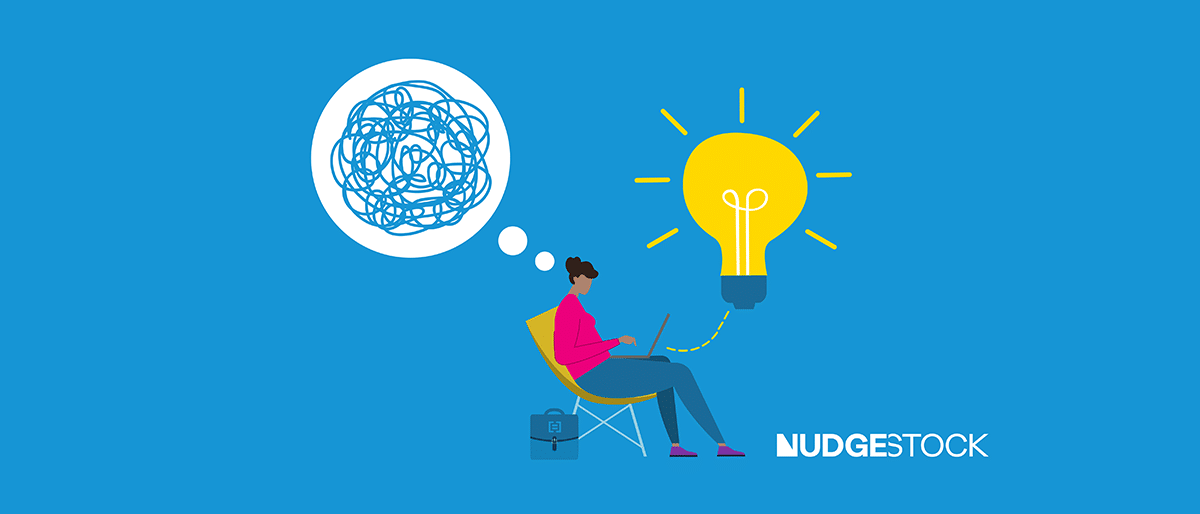Our Thinking Wed 26th July, 2023
8 learnings from Nudgestock 2023
Nudgestock, apparently the world’s biggest festival of behavioural economics, happened on July 7th and I was fortunate to be in attendance in the Old Truman Brewery in London. The year’s theme was “messy”, something close to my own heart. Mess is, to my mind, a prerequisite for creative thinking. Here are 8 messy ideas I collected over the course of the day.
Logical trumps illogical in business
Unfortunately in business you often need to do things that don’t make logical sense. And that’s a pain point again and again and again. As Rory Sutherland, the face of Nudgestock, put it, “Creative people always have to present their ideas to rational people.” (Note: this almost never happens the other way around)
Look for opposites
Another gem from Rory in his keynote was that, in marketing, the opposite of a good idea might also be a good idea. A few examples he gave:
- In London, the new Elizabeth Line cost just under £19bn to construct, and has been in planning for decades (the first proposals came in the 1940s…) In contrast, some millions have been spent rebranding and rethinking the presentation of a series of existing lines (now known as The Overground). Whilst the need for brand new infrastructure is undoubted, the curious thing is that the Overground now carries the same number of passengers as the Elizabeth Line.
- A high-end restaurant wanted to stop its patrons using mobile phones at their tables, but not by something as uncouth as a sign telling people not to use their phones. The solution? A sign at the exit reminded people to turn their phones back on as they left. Clever use of social pressure to achieve an outcome without conflict.
Pretty and clear
Data visualisations can be pretty or ugly. They can also be clear or confusing. Not enough are pretty and clear.
This came from a wonderful presentation from Mona Chalabi, an artist and data journalist who is in my experience a very rare thing – someone who is artistically creative and also really understands how to interpret data.
Taking Women More Seriously
Journalist Mary-Ann Sieghart explored the gap that exists in our society in perceptions of the skills, abilities and talent of men and women. Put simply, both men and women expect less of the capabilities of women in the workplace. This is a theme she explores in her book The Authority Gap, but Sieghart offered some fairly straightforward advice to spot issues in teams, namely:
- Are women’s voices being heard?
- Are they being talked over?
- Do women’s views only get credit when they are repeated by a man?
If we see these behaviours happening in the workplace, we need to call them out.
Deep fakery
There was some fascinating research from Steve Keller and Thom Noble from insight business CloudArmy into perceptions of computer-generated voices.
Humans’ ability to consciously select whether a voice they hear is real or synthesised is no better than flipping a coin at 50%. However, subconsciously we are likely to rate a real human voice as 20%+ more trustworthy than a robot voice.
Where it then gets really interesting is that if you then tell people that the real human voice was a machine then their trust in that voice plummets to below the average for an automated voice. The same impact doesn’t happen on robot voices.
It’s all about the promise
Mimi Turner from LinkedIn explored some research they had commissioned looking at the impact of different B2B advertising strategies. What they found was that advertising that contained some sort of brand promise had a massively better impact on the targets than those that didn’t. Surprisingly, few B2B adverts contain a clear articulation of the value of the product or service that the advertiser offers to their customer.
Hangry is real
Psychologist Kimberly Wilson explored the ways in which our physiology impacts our psychology, including what’s going on when we are hungry, and how eating protein rather than carbohydrates makes us better able to accommodate the unfairness of the world.
You might be asleep as you read this
Professor Guy Leschziner finished the day with a fascinating insight into how sleep works. In particular, he explored how different parts of the brain can sleep at different times, and as such, you might actually be asleep as you read this. However, if you want better sleep, Cognitive Behavioural Therapy (CBT) is now much better rated for successful outcomes than sleeping tablets.



